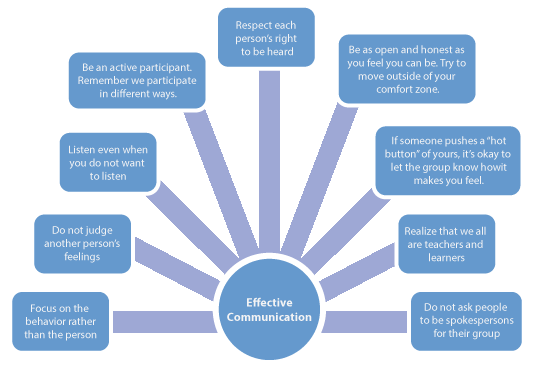Diversity in the Classroom
Instructors often require students to work in groups to complete class assignments. Students worry about finding times to meet, working with people they don’t know, and having to do more than their fair share of the work. How do group assignments enhance your awareness and understanding of diversity?
Cultivate an appreciation for diversity.
At UMUC, you interact with students with educational goals, career aspirations, and educational backgrounds that are different from your own. Some students are returning for their second bachelor’s degree, while others haven’t been in a classroom in 20 years. Some students are older and looking to develop new knowledge and skills, while others are fresh out of high school and are still trying to figure out who they want to be when they “grow up.”
The composition of the typical UMUC classroom mirrors the increasing diversity of the United States. As a nation, we are getting older and more diverse in terms of race and ethnicity. We are also more tolerant of differences in sexual orientation, gender roles, and family structure. Group work allows you the opportunity to interact with others who may be different from yourself. This experience is invaluable in preparing for a diverse work environment.
Enhance the learning experience.
When you learn about the lives of others who have faced opportunities and challenges unlike your own, you are forced to observe the world differently and to think more critically about the human experience. This gives you a deeper appreciation for course content. For example, an information management student may develop a better understanding of user needs based on what he or she learns from classmates with different levels of access to technology. A marketing major may learn to appreciate that the older adult population is an important and growing consumer base with particular interests and needs.
Create better communicators.
When you work with people who are different, it causes you to be more thoughtful about what and how you communicate. You don’t want people to misconstrue your words and take offense. The ability to be sensitive and respectful of the perspectives of others is a valuable skill that produces better students, workers, and citizens.
Produce better solutions to problems.
When confronted with a complex problem, you normally resort to a solution that has worked in the past. Group work, by its very nature, provides members with more potential solutions to a problem. Members don’t usually pick the one solution they like the best. Instead, they discuss the pros and cons of each solution. In so doing, they may develop a far more creative and effective solution than was possible through the efforts of just one person.
Figure 5.2
Effective Communication

Diagram based on concepts presented by Bucher, R.D., & Bucher, P. (2009). Diversity Consciousness: Opening our Minds to People, Cultures and Opportunities, 3rd Ed., Prentice-Hall.
Tips for Success in Group Projects
1. Show respect.
In order to create a climate for open and honest dialogue and to encourage the broadest range of viewpoints, it is important for class participants to treat each other with respect.
2. Generate understanding.
The purpose of group work is to produce a project that represents the ideas and work of several students. The expression of the broadest range of ideas, including dissenting views, accomplishes this goal. However, in expressing viewpoints, you should try to raise questions and comments in ways that will promote learning, rather than defensiveness and conflict in other students.
3. Don't personalize the dialogue.
Keep all discussion and comments around the project, rather than around any one individual. Direct challenging comments or questions to the instructor or the entire group.
4. It's OK to disagree.
Remember that it is OK to disagree with one another. The purpose of dialogue and discussion is not to convince each other of different viewpoints. Rather, the purpose of dialogue in the classroom is to reach higher levels of learning by examining different viewpoints and opinions.
5. The whole is greater than the sum of its parts.
Listen to everyone’s thoughts and suggestions. Don’t dismiss anyone’s ideas right away. Instead, see if you can find ways to combine several ideas in order to make your group project as strong as it can be.
6. Everyone is expected to participate.
All groups have natural leaders and followers. Regardless of the role you assume in your group, remember that everyone is expected to take part in group work. When there are people who do not participate or contribute their share of the project, contact your instructor for guidance.